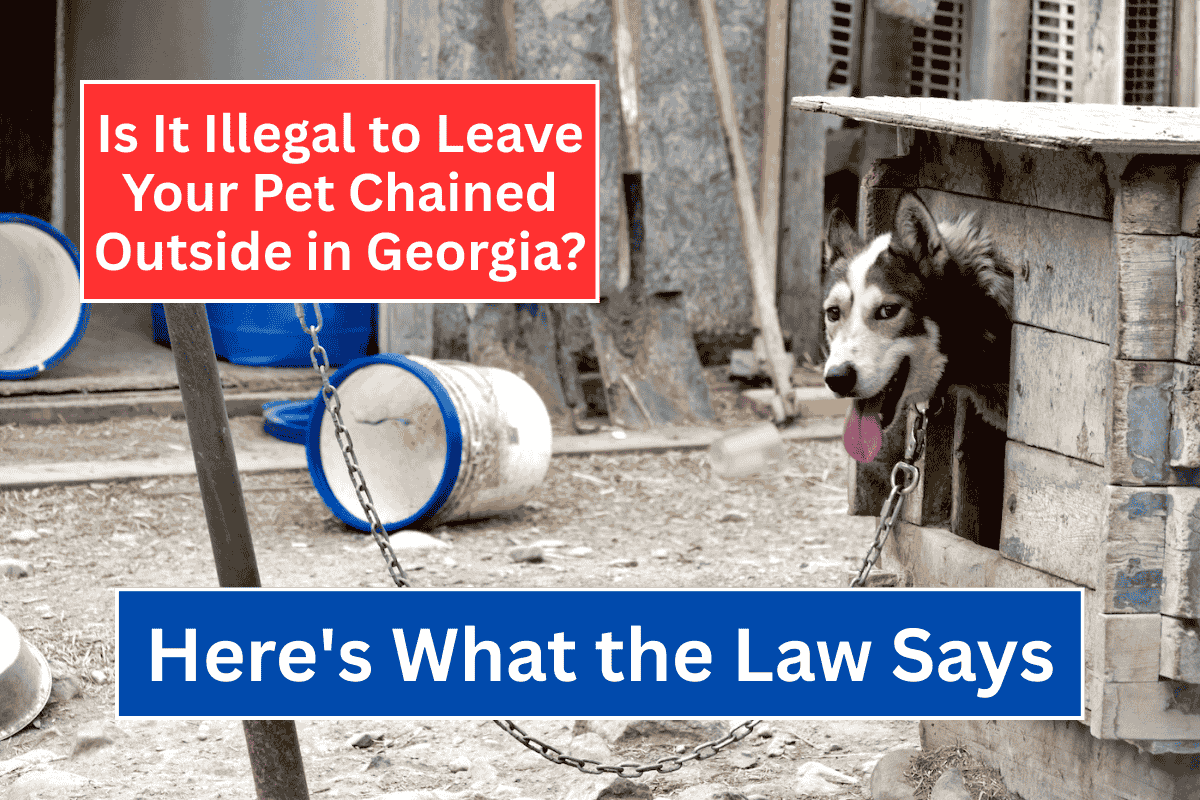Dogs are beloved companions, offering loyalty and affection to their owners. However, when it comes to their well-being, responsible care is crucial.
One issue that continues to raise concerns is the practice of chaining dogs outside for extended periods. In Georgia, this issue is addressed by various statewide regulations and local ordinances, which aim to ensure the safety and health of pets.
This article provides a comprehensive look at the legality of chaining dogs outside in Georgia, the potential consequences of violating tethering laws, and alternatives to this practice that promote the health and happiness of dogs.
The Problem of Chaining Dogs
Chaining a dog for prolonged periods poses several risks to their physical and psychological well-being. When dogs are tethered outside:
Physical injuries: Dogs can become entangled in their tether, leading to accidents, or may get into fights with other animals.
Psychological distress: Chained dogs often experience loneliness, frustration, and anxiety due to their restricted movement and lack of socialization.
Aggression: Dogs left alone outside for extended periods may develop aggression toward people or other animals.
Given these potential harms, it is important to understand the legal implications of chaining a dog in Georgia.
Georgia’s Stance on Chaining Dogs
In Georgia, statewide laws do not outright ban chaining dogs, but there are regulations that govern tethering practices to ensure the animals’ well-being. Additionally, some counties have enacted stricter ordinances to further protect pets.
Tethering Laws in Georgia
Here’s an overview of the rules surrounding the tethering of dogs in Georgia:
Statewide Regulations
While Georgia does not have a blanket ban on chaining dogs, there are specific guidelines for responsible tethering:
Movement: The tether must allow the dog enough room to reach food, water, and shelter.
Tether type: The tether cannot be a choke chain or excessively heavy.
Access to shelter: The dog must have access to shade and protection from the weather elements (sun, rain, extreme temperatures).
Supervision: The dog should not be left unattended while tethered.
These regulations are intended to mitigate some of the negative impacts of chaining a dog, but they still allow the practice under specific conditions.
County-Specific Ordinances
Some counties in Georgia have stricter laws regarding the tethering of dogs. Here are examples:
Cobb County: It prohibits leaving a dog tethered outside unattended. The county also specifies the type of tether allowed and mandates that dogs have fresh food, water, and adequate shelter at all times.
DeKalb County: Similar to Cobb County, DeKalb County also bans leaving a dog unattended while tethered. Their ordinance focuses on ensuring the dog has adequate shelter with proper ventilation and protection from the sun and rain.
What Constitutes a Violation?
If you violate Georgia’s tethering laws or the specific ordinances of your county, you could face fines or criminal charges. Common violations include:
Short tether length: The tether is too short, restricting the dog’s ability to move freely and access food, water, and shelter.
Inadequate shelter: The shelter provided is insufficient to protect the dog from extreme weather.
Lack of food or water: The dog does not have access to fresh water and proper food.
Unsanitary conditions: The area where the dog is tethered is unclean or poses health risks.
Unattended tethering: Leaving a dog outside unattended while tethered is a clear violation, especially in counties with stricter ordinances.
Responsible Tethering Guidelines (If Absolutely Necessary)
While chaining a dog is generally discouraged, there might be situations where short-term tethering is unavoidable. If you must tether your dog, here are the guidelines for doing so responsibly:
Short-term use only: Never tether your dog for prolonged periods. Keep tethering to a few hours at most.
Fresh water and food: Always provide fresh water and appropriate food within easy reach of the dog.
Appropriate shelter: Make sure your dog has access to adequate shelter that protects them from the elements.
Secure collar and tether: Use a properly sized collar and a secure tether that allows the dog enough room to move around without the risk of entanglement.
Supervision: Never leave a tethered dog unattended. Constant supervision is necessary to ensure their safety and well-being.
Alternatives to Chaining Dogs
Instead of chaining a dog, there are better alternatives that allow dogs to exercise freely and stay safe:
Fenced-in yards: A securely fenced yard provides your dog with the freedom to roam and exercise, all while being safe and contained.
Spacious outdoor enclosures: If a fenced yard isn’t available, consider using a spacious, secure outdoor enclosure. Make sure the enclosure provides enough space, access to shade and shelter, and is clean.
Indoor pet containment systems: If you live in an apartment or other small space, consider indoor containment systems, such as gates or playpens, to create a designated area for your dog.
Reporting Animal Neglect in Georgia
If you suspect that a dog is being chained outside in violation of Georgia’s tethering laws or county ordinances, you can report it to local animal control authorities or a humane society. Georgia law takes animal welfare seriously, and violations of tethering laws can lead to criminal charges and the removal of the animal from unsafe conditions.
While chaining a dog may seem like a simple and easy way to keep them outside, it is far from ideal for their health and well-being. Dogs are social animals that require interaction, exercise, and protection from the elements.
Responsible pet ownership includes providing a safe, humane environment for your dog, whether that means using a fenced-in yard, a spacious enclosure, or other methods that prioritize your dog’s happiness and safety.
By adhering to the guidelines outlined above and exploring alternatives to chaining, you can ensure that your dog lives a happy, healthy life while avoiding potential legal consequences.












